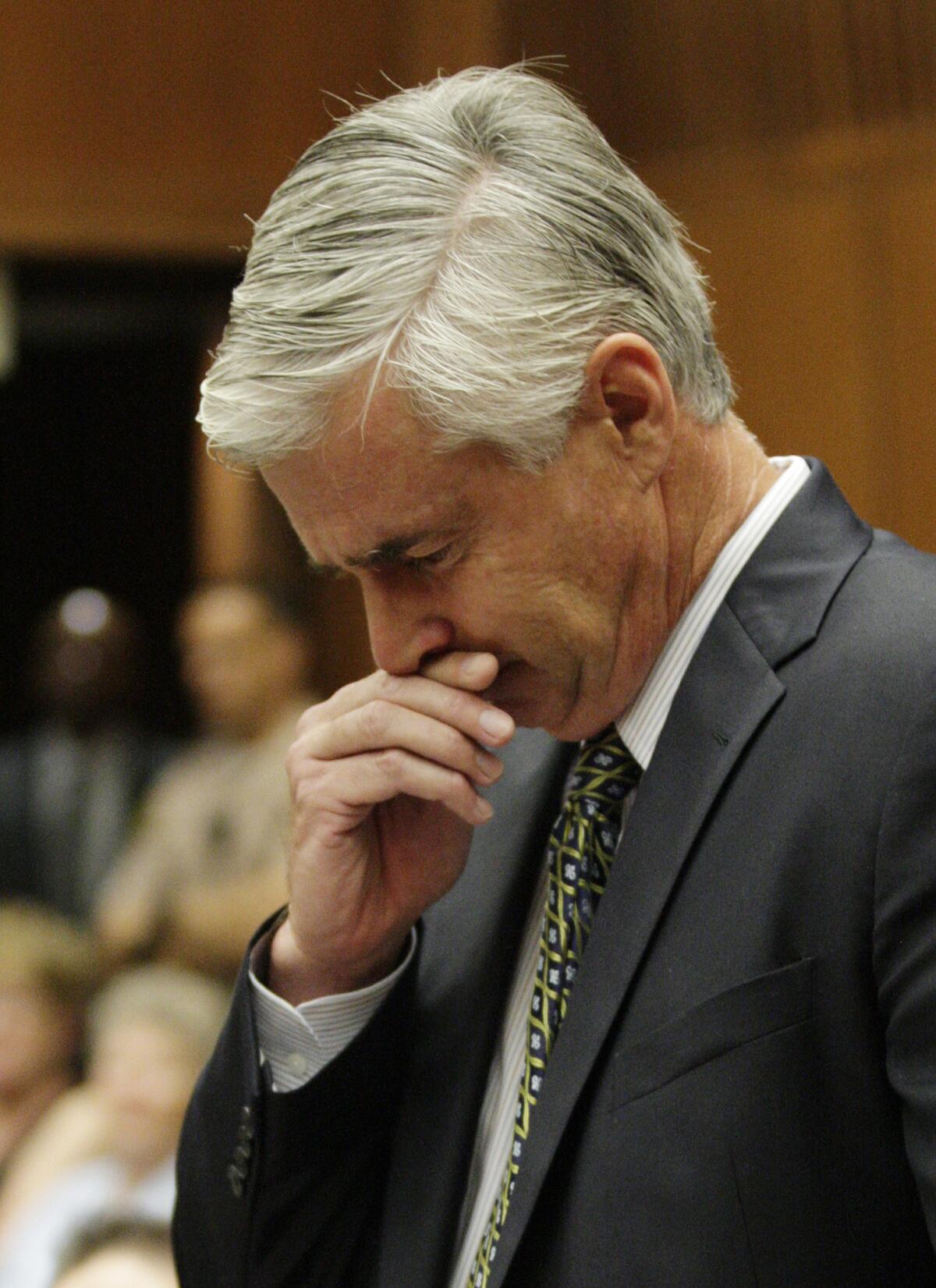Matthew McGough on how an LAPD officer hid a murder for nearly 30 years

- Share via
In 1986 Det. Stephanie Lazarus, a Los Angeles police officer, entered the home of her ex-lover, John Ruetten, and murdered his new wife, Sherri Rasmussen, beating her brutally during a struggle before shooting her three times. Despite evidence to the contrary, lead detective Lyle Mayer decided almost immediately that the murder was committed by two men as part of a botched robbery gone wrong, and nothing said by family or friends changed that perspective.
The detectives failed to interview many relevant people, including one who witnessed Lazarus harassing Rasmussen at her job before the murder. The case remained unsolved; eventually investigative material — including the separate interviews where Ruetten mentioned Lazarus and where Rasmussen’s father, Nels, pointedly asked police to check out the ex-girlfriend who had been hassling Rasmussen — as well as most potential DNA evidence went missing.
In 2009, a few diligent and determined detectives aided by a persistent civilian criminalist who had already been ignored by other police officers pieced together what had happened from the DNA of a bite mark on Rasmussen’s arm. Lazarus was brought to justice in 2012.
Now, Matthew McGough has stepped into that chasm, filling in the full story with a blizzard of meticulous, sometimes overwhelming detail — his book, “The Lazarus Files: A Cold Case Investigation,” weighs in at nearly 600 pages.
“Once the trial happened and I had the benefit of police records and Stephanie’s diary and the various scientific reports, it suddenly [became] possible to tell a story almost over the shoulder of the people who were living it at that time,” says McGough. He was a writer for “Law & Order” in 2009, and had previously met Lazarus for a book he was going to write about art theft, which at the time was her beat.
McGough, who reported on the saga for nearly a decade, takes a low-key, “just-the-facts” approach even with the elements that lend themselves to soap opera. Ruetten was never a suspect but he also was not forthright with police about what had previously happened with Lazarus. Several years after the murder, since Lazarus was not a suspect, Ruetten again began sleeping with his wife’s killer.
“I did not think it would serve anyone involved or what I was trying to do to pump up the drama in a situation that was already so full of drama,” McGough says. “It would have felt exploitative and counterproductive. My impulse was to go in the opposite direction with the aspects of the story that were incredibly sensational. The most responsible thing I could do was to get out of the way and let the facts speak for themselves.”
McGough spoke to The Times about the case and his work on the book.

What drew you to the Lazarus case?
Initially, it was the surreal nature of having met this woman under very innocuous circumstances and then learning she had this insane secret. I wanted to know whether this could possibly be true — that she committed a murder more than 20 years earlier and continued working as a cop the entire time. That’s what got me to court and getting to know the people affected by it — the Rasmussens, their friends, the detectives, the prosecutors — pulled me deeper into it. The way the story unspooled it retained that surreal quality all the way through. And it’s still there.
Nels Rasmussen and his wife, Loretta, have their account of what happened and when I interviewed Lyle Mayer he was adamant that they never mentioned this woman [Stephanie Lazarus]. They can’t both be right. The LAPD did not want to talk about this. The questions were out there but felt taboo for anyone to broach.
With all the cases of police corruption and violence against civilians nationwide and locally in the last 10 years do you think the conflicting statements from the Rasmussens and the police will be read differently now than they might have been in 2009?
Of course. A lot has happened in the last 10 years and a lot of people’s eyes have been opened. There’s desire among a lot of people to want the police to be better and to learn from mistakes, and if there has been wrongdoing to admit those mistakes rather than deny them.
That’s the reason for me to do my investigation. There was a very serious failure by the department — whether it was corruption or incompetence, this was a police officer that committed a murder and got away with it for more than 20 years. That’s not good and should not happen again. If the department is not going to look at that then no lessons can be drawn and it can happen again.
Do you believe Lazarus actively destroyed evidence herself or with help from other police?
I think that’s an open question. When Stephanie was arrested, the LAPD promised it would do an investigation into what went wrong. That never happened. Is that an oversight or is that something else more intentional? It’s certainly evocative of what happened in 1986. A couple of years later they stated their reinvestigation found no evidence of any intentional cover-up, but no one I spoke with had been contacted by the LAPD. That is troubling to me.
If there’s no wrongdoing then investigate and you’ll discover that. Then the department’s hands would be clean today. Not taking that step only raises more questions.
Was it frustrating knowing the police would never be fully open with you about it? Or was there satisfaction shining the light on their mistakes and inconsistencies, knowing you were bringing the LAPD to account?
I want to encourage the department to be more transparent, to break down the idea of ‘us versus them’ that is at the root culturally of a lot of the department’s problems historically. I have no idea how the police department will react to the book, but I hope in the long term it will make the police department better. As a citizen of L.A., I want the best police department, for myself, for my kids, for society.
::
“The Lazarus Files: A Cold Case Investigation”
Matthew McGough
Henry Holt and Co. 608 pp., $30
Miller is a writer in New York.
More to Read
Sign up for our Book Club newsletter
Get the latest news, events and more from the Los Angeles Times Book Club, and help us get L.A. reading and talking.
You may occasionally receive promotional content from the Los Angeles Times.








